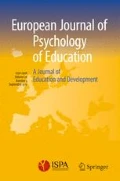Abstract
Links between the development of social understanding and social processes are considered, in the context of data on the development of causal reasoning and argument in conflict, drawn from a longitudinal study of 50 children observed in conversation with their mothers, siblings, and friends at 33 and 47 months of age. Children showed powers of causal reasoning before they were 3 years, capabilities that showed rapid developmental change; their interest in cause was particularly focussed on psychological causality and social action. The contexts of disputes were especially important. Differences were found in children’s arguments with their mothers, siblings, and friends, with more ‘other-oriented’ reasoning shown with friends. It is argued that the data support Vygotskyan ideas on the significance of social interaction in developmental advance, that the pragmatics of what children and their partners are trying to do must be taken into account in considering what children may be learning in interactions, and that ‘social competence’ should not be treated as an individual within-child trait, but that we should move towards a ‘relationships’ approach to the development of social understanding.
Similar content being viewed by others
References
Asher, S. R., & Coie, J. D. (1990).Peer rejection in childhood. Cambridge: Cambridge University Press.
Astington, J. A., Harris, P. L., & Olson, D. R. (1988).Developing theories of mind. Cambridge: Cambridge University Press.
Brennan, R. L., & Prediger, D. J. (1981). Coefficient kappa: Some uses, misuses and alternatives.Educational and Psychological Measurement, 41, 687–699.
Brown, J., & Dunn, J. (1991). ‘You can cry, Mum’: The social and developmental implications of talk about internal states.British Journal of Developmental Psychology, 9, 237–256.
Bruner, J. (1983).Child’s talk. Oxford: Oxford University Press.
Damon, W. (1977).The social world of the child. San Francisco: Jossey-Bass.
Doise, W., & Mugny, G. (1984).The social development of the intellect. Oxford: Pergamon Press.
Dunn, J. (1988).The beginnings of social understanding. Cambridge, MA: Harvard University Press.
Dunn, J., Bretherton, I., & Munn, P. (1987). Conversations about feeling states between mothers and their young children.Developmental Psychology, 13, 132–139.
Dunn, J., & Brown, J. (1993). Early conversations about causality: Content, pragmatics, and developmental change.British Journal of Developmental Psychology, 11, 107–123.
Dunn, J., Brown, J., Slomkowski, C., Tesla, C., & Youngblade, L. (1991). Young children’s understanding of other people’s feelings and beliefs: Individual differences and their antecedents.Child Development, 62, 1352–1366.
Dunn, J., & Munn, P. (1987). The development of justification in disputes.Developmental Psychology, 23, 791–798.
Eisenberg, A. R. (1992). Conflicts between mothers and their young children.Merrill-Palmer Quarterly, 38, 21–43.
Hartup, W. W. (1983). Peer relations. In P. H. Mussen (Ed.),Handbook of Child Psychology, Vol. IV: Socialization, personality, and social development, (pp. 103–196). New York: Wiley.
Hauser, R. M., & Featherman, D. L. (1977).The process of stratification: Trends and analysis. New York: Academic Press.
Hay, D. (1984). Social conflict in early childhood. In G. Whitehurst (Ed.),Annals of Child Development, (Vol. 1; pp. 1–44) Greenwich, CT: JAI Press.
Hinde, R. A. (1990). Commentary.Human Development, 33, 283–288.
Hood, L., & Bloom, L. (1979). What, when, and how about why: A longitudinal study of early expressions of causality.Monographs of the Society for Research in Child Development,44 (6, Serial No. 181).
Kramer, L. (1990). Becoming a sibling: With a little help from my friends. In M. Mendelson (Chair),Becoming a sibling: Adjustment, roles, and relationships. Symposium at the 7th International Conference on Infant Studies, Montreal.
Kuzczynski, L., & Kochanska, G. (1989). Development of children’s noncompliance strategies from toddlerhood to age 5.Developmental Psychology, 26, 398–408.
Miller, P. J., Mintz, J., Hoogstra, L., Fung, H., & Potts, R. (1992). The narrated self: Young children’s construction of self in relation to others in conversational stories of personal experience.Merrill-Palmer Quarterly, 38, 45–67.
Piaget, J. (1932).The moral judgment of the child. London: Routledge & Kegan Paul.
Scholnick, E. K., & Wing, C. S. (1992). Speaking deductively: Using conversation to trace the origins of conditional thought in children.Merrill-Palmer Quarterly, 38, 1–20.
Slomkowski, C. L., & Dunn, J. (1992a). Arguments and relationships within the family: Differences in young children’s disputes with mother and sibling.Developmental Psychology, 28, 919–924.
Slomkowski, C. L., & Dunn, J. (1992b).Conflict in close relationships: Young children’s disputes with friends, siblings and mothers. Unpublished manuscript.
Stein, N. L., & Miller, C. A. (in press). The process of thinking and reasoning in argumentative contexts: Evaluation of evidence and the resolution of conflict. In R. Glaser (Ed.),Advances in Instructional Psychology. Hillsdale, NJ: Lawrence Erlbaum Associates.
Sullivan, H. S. (1953).The interpersonal theory of psychiatry. New York: Norton.
Tesla, C., & Dunn, J. (1992). Getting along or getting your way: The development of young children’s use of argument with mother and sibling.Social Development, 1, 107–121.
von Eye, A., & Sorensen, S. (in press). Models of chance when measuring interrater agreement with kappa.Biometrical Journal.
Wellman, H. M. (1990).The child’s theory of mind. Cambridge, MA: Bradford Books.
Zahn-Waxler, C., & Radke-Yarrow, M. (1982). The development of altruism: Alternative research strategies. In N. Eisenberg-Berg (Ed.),The development of prosocial behavior, (pp. 109–137). New York: Academic Press.
Author information
Authors and Affiliations
Additional information
This study was supported on a grant from NICHD (HD 23158).
Rights and permissions
About this article
Cite this article
Dunn, J. Social interaction, relationships, and the development of causal discourse and conflict management. Eur J Psychol Educ 8, 391–401 (1993). https://doi.org/10.1007/BF03172696
Received:
Issue Date:
DOI: https://doi.org/10.1007/BF03172696




